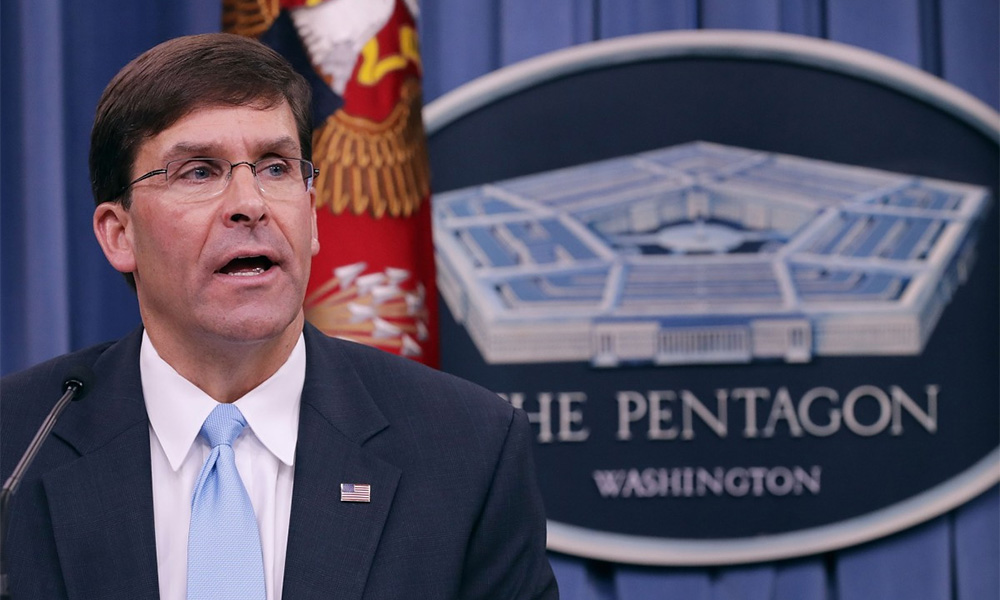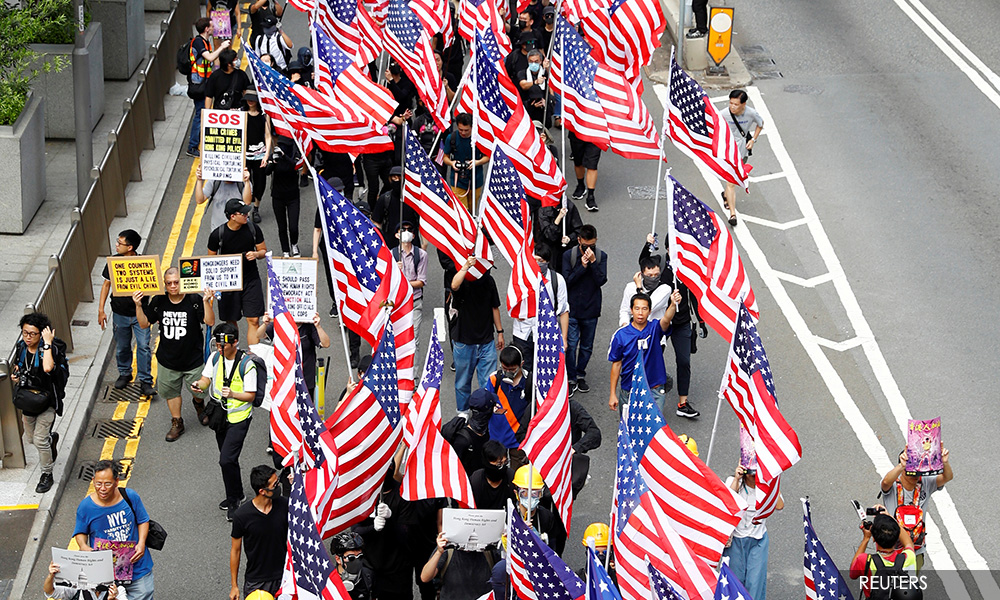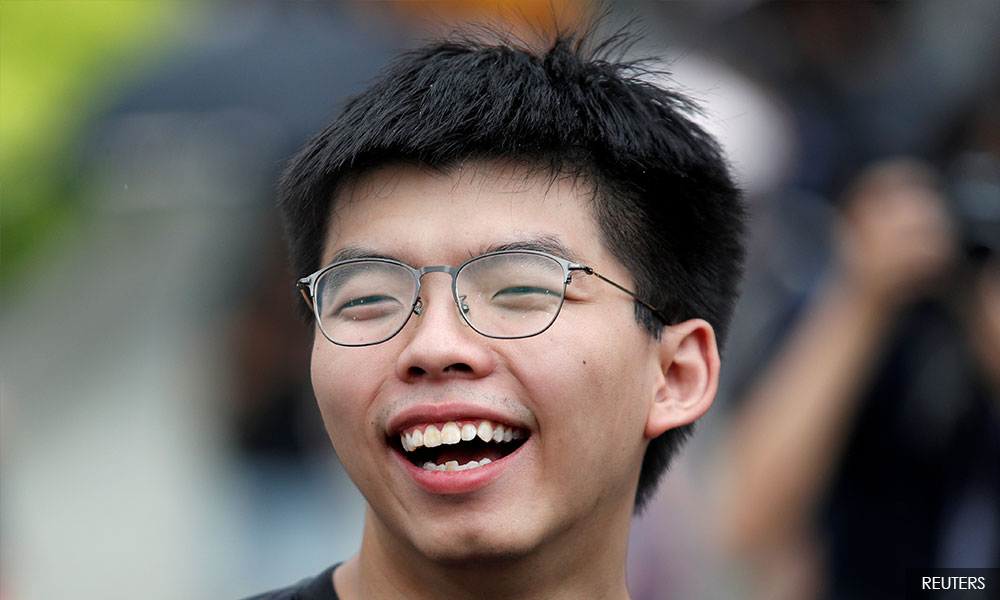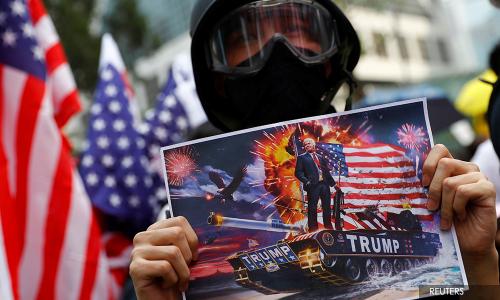Hong Kong protesters sing US anthem in appeal to Trump for help
Thousands of Hong Kong protesters on Sunday sang the 'Star Spangled Banner' and called on US President Donald Trump to "liberate" the Chinese-ruled city, the latest in a series of sometimes violent protests to rock the territory.
The protest was peaceful, but fell into a now familiar pattern of barricades, window smashing and street fires, this time in the smartest banking and shopping district of the former British colony, as evening fell.
Police stood by as protesters, under a sea of umbrellas against the sub-tropical sun, waved the Stars and Stripes and placards demanding democracy.
"Fight for freedom, stand with Hong Kong," they shouted before handing over petitions at the US Consulate. "Resist Beijing, liberate Hong Kong."
US Defence Secretary Mark Esper (below), on Saturday, urged China to exercise restraint in Hong Kong, which returned to Chinese rule in 1997.

Esper made his call in Paris as police in Hong Kong prevented protesters from blocking access to the airport, but fired tear gas for a second night running in the densely populated district of Mong Kok.
Last month Trump suggested China should "humanely" settle the problem in Hong Kong before a trade deal is reached with Washington. Earlier, Trump called the protests "riots" that were a matter for China to deal with.
The vandalism started in the evening. Police have responded to violence over 14 weeks with water cannon, rubber bullets and tear gas.
Riot police cleared the Central MTR metro station, near Sunday's march, where activists smashed a long glass panel at a station entrance and other windows, and daubed graffiti on the walls outside. Several arrests were made.
Activists dug up bricks from pathways to break windows, and set fires to cardboard boxes on the streets, building barricades with metal fencing.
Hundreds of others milled about surrounding streets lined with banks, jewellery shops and top-brand shopping arcades.

MTR stations have been attacked recently because of televised scenes of police beating protesters on a train on Aug. 31 as they cowered on the floor. Protesters are demanding the MTR hands over CCTV footage of the beatings.
“With the US locked in a trade war with China at this point in time, it’s a good opportunity for us to show (the United States) how the pro-China groups are also violating human rights in Hong Kong and allowing police brutality," said Cherry, 26, who works in the financial industry, as protesters marched towards the US Consulate.
"We want the US administration to help protect human rights in Hong Kong.”
Hong Kong returned to China under a "one country, two systems" formula that guarantees freedoms not enjoyed on the mainland. Many Hong Kong residents fear Beijing is eroding that autonomy.
China denies the accusation of meddling and says Hong Kong is an internal affair. It has denounced the protests, accusing the United States and Britain of fomenting unrest, and warned of the damage to the economy.
Hong Kong leader Carrie Lam announced concessions this week aimed at ending the protests, including formally scrapping a hugely unpopular extradition bill, which ignited the unrest in June. Many protesters said it was too little, too late.
The bill would have allowed the extradition of people to mainland China to stand trial in courts controlled by the Communist Party. Hong Kong has an independent judiciary dating back to British rule.
But the demonstrations have long since broadened into calls for democracy.
US legislation addressing China's actions in Hong Kong will be among the top priorities pushed by Senate Democrats when Congress returns to work after a recess next week, their leader, Senator Chuck Schumer, said on Thursday.
Schumer urged Senate Majority Leader Mitch McConnell, a Republican who sets the floor agenda, to bring up a bipartisan bill that would require an annual justification of the special treatment afforded by Washington to Hong Kong, including special trade and business privileges, under the US Hong Kong Policy Act of 1992.
The legislation, called the Hong Kong Human Rights and Democracy Act, would also mandate that officials in China and Hong Kong who have undermined the city’s autonomy are vulnerable to sanctions.
Protesters, in their petition, urged that it be passed in full.
Trump alternates between praising Chinese President Xi Jinping as a great leader and casting him as an enemy, while excoriating China for taking advantage of US businesses.
Beijing announced that top officials would head to Washington in early October to hold talks aimed at ending the tit-for-tat trade war, now in its second year, which has roiled markets and hammered global growth.

Joshua Wong (above), one of the leaders of the pro-democracy "Umbrella" movement five years ago, was re-arrested at the airport on Sunday on return from Germany and the United States for breaching bail conditions, he said.
He had been charged with inciting and participating in an unauthorised assembly outside police headquarters on June 21, and released on bail.
"Preliminary legal advice suggested that the court had acknowledged and approved my trips to Germany and the US when it granted bail on Aug. 30," he said in a statement. "Therefore, it is believed some mistakes have been made on the bail certificate."
He said he thought he would be freed on Monday.
- Reuters
RM12.50 / month
- Unlimited access to award-winning journalism
- Comment and share your opinions on all our articles
- Gift interesting stories to your friends
- Tax deductable

